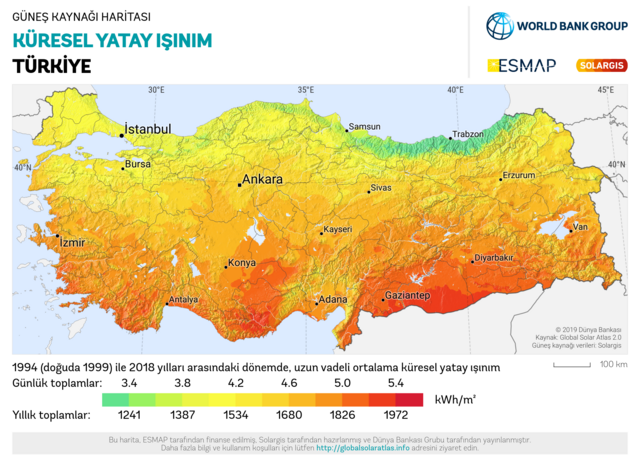Ann Arbor (Informed Comment) – The energy consultancy Ember has issued a new report on solar energy in Turkiye. As I discussed last December, that form of energy is making tremendous strides there.
Ember finds that in 2024, wind and solar surged ahead of coal for the first time.
I remember my first visit to Turkey in summer 1976, and how dirty the air was because electricity and heating/ air conditioning ran on coal. Air quality improved in later decades because more fossil gas was used. But most coal and gas nowadays are imported, which makes for a hefty fuel bill. This consideration is helping drive the adoption of renewables.
To be specific, solar power soared by 39% in 2024 compared to the previous year. In 2023, solar only accounted for 5.7% of Turkiye’s electricity, but it is now 7.5%.
That’s a huge increase in percentage terms. But Turkiye has the kind of solar potential that Spain does, and in Spain solar accounts for 25% of electricity generation. Turkiye’s solar power percentage in the grid, Ember points out, is still a little lower than that of Poland. Both Turkiye and Poland started off primarily dependent on coal.

Solar resource: GLOBAL HORIZONTAL IRRADIATION (GHI) – this map provides a summary of the estimated solar energy available for power generation and other energy applications. © The World Bank, Source: Global Solar Atlas 2.0, Solar resource data: Solargis / CC BY 4.0. H/t Wikimedia Commons..
Wind also increased in 2024, by 10.7%, about the same increase as was seen the previous year.
In consequence, wind and solar together provide 18% of Turkiye’s electricity now. The country is investing $10 billion in megabatteries, with an aim toward increasing the storage capacity so that it can capture excess solar and wind power and store it for the night when it is needed.
Turkiye is still deeply dependent on coal, which accounts for 35.6% of electricity generation. Turkiye is even more dependent on coal than are Germany and Poland, so it is the coal champ in Europe. Still, it is possible that coal use has hit its peak and that from here on in it will decline as a percentage of the country’s electricity grid.
Coal is the dirtiest of the fossil fuels and phasing it out quickly is essential to combating the worst effects of the climate breakdown.
Because of high prices, Turkiye’s use of fossil gas has slipped, but fossil fuels still make up 55% of electricity generation. That is, however, the lowest percentage since the early 1990s.
Turkiye’s demand for new electricity is still growing, though demand has slowed in the past few years. Still, demand is expanding faster than new wind and solar are being installed. Turkiye has installed 31 TWh of new wind and solar over the past 5 years, but demand has grown by 42 TWh. So, if Turkiye is going to reduce its carbon production, it needs to grow wind and solar even more dramatically.
Turkiye’s economy grew by 3.2% in 2024, more than expected. It was a good showing, but the rate in the previous year had been 5.1%, and in 2021, coming off of the COVID-19 epidemic, the GDP had surged 11%. This year, 2025, is a question mark. The government has wrestled inflation down from the unsustainable high of 70% last May. But it is still, high, at 38%. Trump is only imposing a 10% tariff on Turkish goods, so it isn’t in the precarious position of, say, Vietnam, going forward.
Turkiye’s energy import bill is a drag on its economy. But the country did cut imports from $69 billion to $65 billion between 2023 and the end of 2024. This 5% cut was owing in some part to the surge in domestic wind and solar production. It seems pretty clear that if Turkiye wants to continue to grow its economy and to cut down its energy bill, it needs to turbocharge the growth of renewable sources of power.
Turkiye hopes to get to about 50% wind and solar power generation by 2035, cutting fossil fuels to only 20% at that point.

 © 2026 All Rights Reserved
© 2026 All Rights Reserved